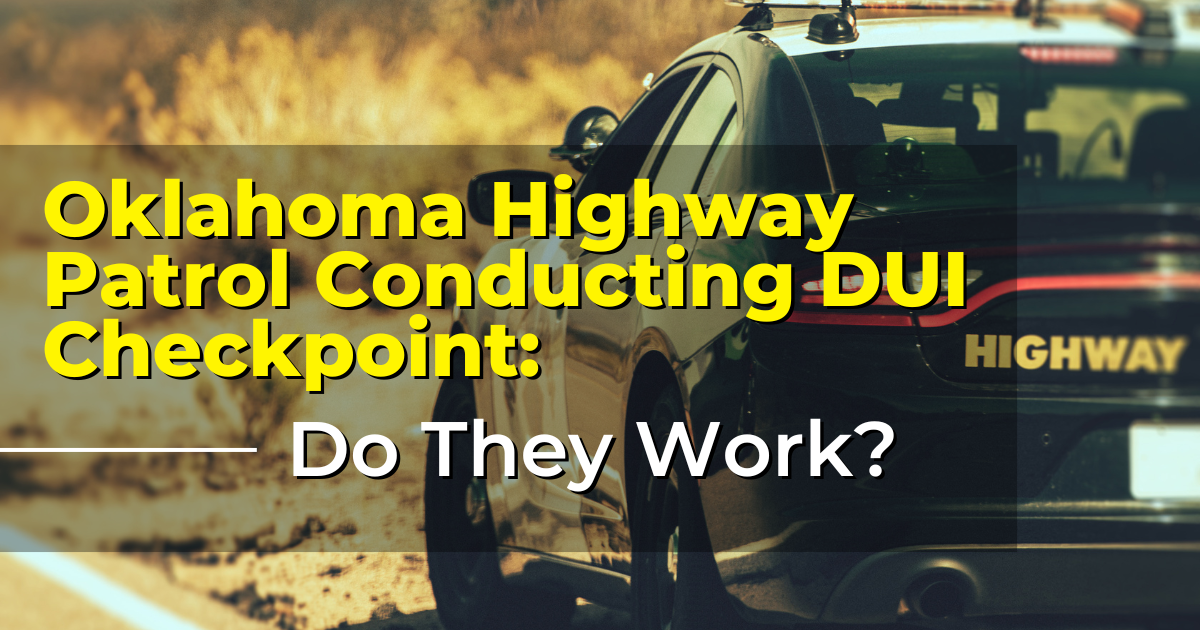Oklahoma Highway Patrol Conducting DUI Checkpoints: Do They Work?
DUI checkpoints, or roadblocks, sound like a great idea in principle, but do they actually work? The Oklahoma Highway Patrol (OHP) recently conducted a driving under the influence (DUI) checkpoint in Oklahoma County. The checkpoint was conducted through a partnership between the OHP, Oklahoma County Sheriff’s Office (OCSO), Oklahoma City Police Department (OKCPD) and Del City Police Department (DCPD). These operations fall under the state’s drunk driving task force, which is named ENDUI. According to Oklahoma City TV station FOX25, there were 407 people killed statewide in drug and/or alcohol-related crashes in 2021. There were 396 deaths on Oklahoma roadways attributed to impaired driving in 2020.
What are Oklahoma DUI Checkpoints like?
DUI checkpoints ensure everyone making use of taxpayer-funded roads is complying with the legal requirements that drivers must abide by. The primary purpose is to ensure that drivers under the influence of alcohol or drugs aren’t endangering individuals on the roads. The assumption is that they’ll catch drivers that otherwise wouldn’t be caught when driving due to being careful. The U.S. Supreme Court has established that sobriety checkpoints are legal. Michigan vs. Sitz, a 1990 case, established that law enforcement agencies have the right to conduct checkpoints to ensure sobriety. Police are required to announce DUI checkpoints in newspapers or through press releases to media outlets, rather than set them up in secret.
ENDUI officials say that forewarning “generally deters citizens” from drinking and driving. It’s common for DUI checkpoints to be set up over a holiday weekend, such as Fourth of July, Christmas or on New Year’s Eve, when many people are drinking.
Are DUI Checkpoints Effective in Oklahoma?
Even though DUI checkpoints are announced days before they are set up, most drivers are unaware of them. So police are usually successful at surprising drivers. Well-publicized checkpoints are effective at accomplishing their goal. Most DUI checkpoints are conducted in tandem with saturation patrols, which involve a large number of police officers patrolling a specific area for a set amount of time, typically less than three hours.
An analysis of the Oklahoma Sobriety Checkpoint Finder web application determined that DUI checkpoints and saturation patrols around Oklahoma City netted 1,260 DUI arrests, 67 arrests for public intoxication and 223 citations for carrying an open container of alcohol during 2020. Statewide totals for DUI arrests (alcohol and drugs) from checkpoints and saturation patrols reached 3,606 in 2020.
Not all DUI checkpoints are as productive as law enforcement officials hope they will be. As an example, about 125 vehicles came through a recent checkpoint in Tulsa during a two hour period, according to OHP. No arrests were made. But during a three-hour checkpoint conducted on July 3, 2021 by the Oklahoma County Sheriff’s Office and several other local agencies police made five arrests for DUI, three drug charges and a handful of vehicle and traffic violations, according to a report from KFOR.
What Do Studies Say?
A study in Traffic Injury Prevention was published in 2004 that examined the effectiveness of checkpoints, and concluded that they reduce fatal crashes by as much as 24%. The study’s authors gave recommendations on how to conduct the most effective checkpoints possible
[In addition to checkpoints being effective,] low-staffing sobriety checkpoints conducted by as few as three to five officers have been shown to be just as effective as checkpoints conducted by 15 or more officers. A modified sobriety checkpoint program using passive alcohol sensors (“PASpoints”) can be implemented by small- to moderate-sized communities in the United States to deter impaired driving. The PASpoint system calls for a small group of three to five officers on traffic patrol duty to converge on a preset site and conduct a mini-checkpoint, returning to their standard patrol duties within two hours.
A recent analysis by BuyAutoInsurance.com found that Oklahoma City ranked 10th in the nation for drunk driving, with 646 DUI arrests per every 100,000 residents. A look at year-to-date data from the Oklahoma Highway Safety Office shows that there have been 448 traffic fatalities in the state this year compared to 546 fatalities during the same time period in 2021.
Learn More
To learn more about how Landmark Recovery of Oklahoma City treats those with alcohol use disorder, give our dedicated admissions specialists a call at 888-448-0302 today. Our mission is to save a million lives in the next century through treating those in our very own backyard. Let us help you get your life back today.

Choose Recovery Over Addiction
We're here 24/7 to help you get the care you need to live life on your terms, without drugs or alcohol. Talk to our recovery specialists today and learn about our integrated treatment programs.




